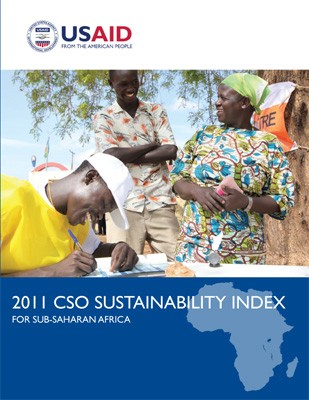- What We Do
- Agriculture and Food Security
- Democracy, Human Rights and Governance
- Democracy, Human Rights and Governance Strategy
- Supporting Free and Fair Elections
- Supporting Vibrant Civil Society & Independent Media
- Protecting Human Rights
- Promoting Accountability & Transparency
- Importance of Democracy, Human Rights, & Governance to Development
- Countering Trafficking in Persons
- Economic Growth and Trade
- Education
- Ending Extreme Poverty
- Environment and Global Climate Change
- Gender Equality and Women's Empowerment
- Global Health
- Water and Sanitation
- Working in Crises and Conflict
- U.S. Global Development Lab

BACKGROUND
The Civil Society Organization Sustainability Index (CSOSI) is a tool that has been used since 1997 to assess the sustainability of the CSO sector in 29 countries in Europe and Eurasia. The CSOSI was first applied in Sub-Saharan Africa in 2009. By using standard indicators and collecting data each year, the CSOSI allows users of the tool to track developments and identify trends in the CSO sector over time while allowing for cross-country and cross-region comparison. It is used by CSO advocates, other development partners, and academics to assess international and regional trends in the civil society sector and to identify common obstacles impeding the sector's sustainability, such as the legal environment, organizational capacity, and financial viability.
APPROACH
The Index measures the sustainability of each country's CSO sector based on the CSOSI's seven dimensions: legal environment, organizational capacity, financial viability, advocacy, service provision, infrastructure, and public image. The CSOSI's CSO implementing partners in each country lead the process of organizing and convening a diverse and representative panel of CSO experts. Country panels discuss the seven dimensions for the year being assessed, and reach consensus on the scores corresponding to each dimension. With the information provided by the expert panel along with desk research, the CSO implementing partner then develops a narrative report.
FINDINGS
Among the sectors in most of the twenty-three African countries included in the CSOSI, there was little change in the overall scores between 2011 and 2010.The Index saw little change in overall sustainability in 2011. Fifteen countries had overall scores in the category of Sustainability Evolving while the remaining eight countries had scores in the Sustainability Impeded category. The scores for Kenya and Uganda improved, while the scores for Angola, Ethiopia, and Senegal deteriorated. Seven countries held elections, which apparently prompted CSOs to increase their advocacy efforts. This increased civic engagement strengthened the CSO sector in those countries, but in some cases it also aggravated relations with the government. The governments of Angola, Ethiopia, and The Gambia enacted or proposed laws that would increase their control over CSOs. In Senegal, the government threatened a CSO movement that opposed constitutional reforms meant to benefit the incumbent president amid pre-election tensions.
2011 Report |
|---|
| Complete 2011 Report [English] |
| Executive Summary [English] |
| Methodology [English] |
| 2011 Score Tables [English] |
Individual Country Reports |
|
|---|---|
| Angola | [English] |
| Botswana | [English] |
| Burundi | [English] |
| Democratic Republic of The Congo | [English] |
| Ethiopia | [English] |
| Gabon | [English] |
| Gambia, The | [English] |
| Ghana | [English] |
| Guinea | [English] |
| Kenya | [English] |
| Liberia | [English] |
| Malawi | [English] |
| Mali | [English] |
| Mozambique | [English] |
| Nigeria | [English] |
| Rwanda | [English] |
| Senegal | [English] |
| Sierra Leone | [English] |
| South Africa | [English] |
| Tanzania | [English] |
| Uganda | [English] |
| Zambia | [English] |
| Zimbabwe | [English] |







Comment
Make a general inquiry or suggest an improvement.